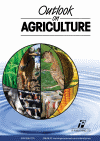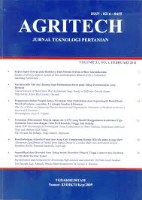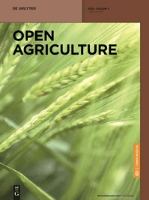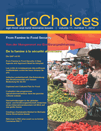
OUTLOOK ON AGRICULTURE
Scope & Guideline
Empowering Research for Global Agricultural Solutions
Introduction
Aims and Scopes
- Sustainable Agricultural Practices:
This area includes research on techniques and strategies that promote long-term agricultural sustainability, focusing on environmental stewardship, resource conservation, and resilience to climate change. - Socio-economic Dynamics in Agriculture:
Investigates the social and economic factors affecting agricultural practices, including farmer behavior, market access, and the role of cooperatives in enhancing productivity. - Gender and Agriculture:
Explores the role of gender in agricultural systems, addressing issues such as gendered access to resources, decision-making processes, and empowerment within agricultural value chains. - Technological Innovations in Agriculture:
Focuses on the adoption and impact of new technologies, including precision agriculture, digital tools, and genetic improvements, on agricultural productivity and sustainability. - Food Security and Policy Analysis:
Examines the relationship between agricultural practices, food security, and policy frameworks, assessing how policies can support sustainable agricultural development. - Agroecological Approaches:
Promotes research on agroecological practices that integrate ecological principles into agricultural systems, highlighting their potential for improving productivity while maintaining ecological balance.
Trending and Emerging
- Climate Change Adaptation and Resilience:
There is an increasing focus on how agricultural systems can adapt to climate change, including research on adaptive practices, policies, and technologies that enhance resilience among farmers. - Digital Agriculture and Technology Adoption:
Emerging themes around the role of digital tools and technologies in agriculture, particularly their impact on smallholder farmers' productivity and access to markets, are gaining traction. - Multi-Stakeholder Approaches:
Research exploring collaboration among various stakeholders, including farmers, NGOs, and policymakers, is becoming more prominent, reflecting the need for integrated solutions to complex agricultural challenges. - Food Systems Transformation:
An emerging trend is the examination of holistic food systems transformation, addressing the interconnectedness of production, consumption, and sustainability in agricultural practices. - Social Equity and Empowerment in Agriculture:
There is a growing emphasis on social equity, particularly regarding gender dynamics and the empowerment of marginalized groups within agricultural value chains, highlighting the importance of inclusive practices.
Declining or Waning
- Traditional Agricultural Practices:
Research focusing solely on conventional farming methods is becoming less frequent, as there is a growing emphasis on innovative, sustainable, and agroecological practices that address modern challenges. - Single Crop Focus:
Studies that concentrate exclusively on single crops are declining. The journal is increasingly favoring research that examines diversified agricultural systems and their benefits for sustainability and resilience. - Static Policy Analysis:
Traditional policy analysis that does not consider the dynamic and evolving nature of agricultural challenges and opportunities is waning. There is a shift towards more adaptive and integrated policy frameworks that respond to changing conditions. - Historical Agricultural Practices:
Research focusing on historical perspectives without connections to current agricultural challenges and innovations is decreasing, as the journal seeks to maintain relevance in contemporary discourse. - Overly Technical Studies:
Papers that are too technical and lack practical implications or applicability in real-world settings are being published less frequently, as the journal aims to bridge the gap between research and practice.
Similar Journals

AGRICULTURAL SYSTEMS
Leading the way in agricultural research and development.AGRICULTURAL SYSTEMS, published by Elsevier Science Ltd, is a premier academic journal that serves as a leading platform for innovative research in the fields of agronomy, animal science, and related biological sciences. With a prestigious impact factor reflected in its Q1 ranking in both Agronomy and Crop Science, as well as Animal Science and Zoology, the journal showcases cutting-edge studies and developments from 1976 through 2024. Located in the United Kingdom, the journal features a robust selection of articles that emphasize the integration of agricultural systems, enhancing global agricultural productivity and sustainability. Although it does not currently offer open access options, AGRICULTURAL SYSTEMS maintains an excellent reputation amongst scholars, epitomized by its high rankings in Scopus, placing it in the top 1% of journals in its categories. This makes it an essential resource for researchers, professionals, and students dedicated to advancing knowledge and practice within the agricultural sector.

Agritech
Exploring New Frontiers in Agricultural TechnologyAgritech is a prominent open-access journal dedicated to advancing the field of agricultural technology. Published by UNIV GADJAH MADA, FAC AGRICULTURAL TECHNOLOGY, this esteemed journal disseminates innovative research and cutting-edge practices that contribute significantly to sustainable agriculture, precision farming, and environmental stewardship. Launched in 1999, Agritech has established itself as a vital resource for researchers, professionals, and students alike, providing a platform for the exchange of ideas and findings that shape the future of agricultural technology. By embracing an open-access model, the journal ensures that high-quality research is accessible to a global audience, promoting collaboration and knowledge sharing in the agricultural community. With an ISSN of 0216-0455 and an E-ISSN of 2527-3825, Agritech remains committed to enriching agricultural practices and policies through rigorous scientific inquiry and innovation.

Journal of Agricultural Extension
Advancing Agricultural Extension for Global ImpactThe Journal of Agricultural Extension serves as a premier platform for the dissemination of innovative research and practices in the field of agricultural extension, playing a crucial role in enhancing agricultural development and education. Published by the AGRICULTURAL EXTENSION SOCIETY OF NIGERIA and boasting an Open Access policy since 2012, this journal aims to increase accessibility to vital information that supports agricultural professionals and researchers. With ISSN 1119-944X and E-ISSN 2408-6851, it encompasses a wide range of topics pertinent to agricultural sciences, education, and development, with its articles contributing to informed practices that uplift rural communities. Although currently categorized in the Q4 quartile across various fields, its commitment to enhancing knowledge export and collaborative research is evident, as it seeks to improve its global standing by 2024. The journal's commitment to quality research makes it an indispensable resource for students, professionals, and researchers dedicated to advancing agricultural practices in Nigeria and beyond.

African Journal of Agricultural and Resource Economics-AFJARE
Empowering research, transforming resources.African Journal of Agricultural and Resource Economics (AFJARE) is a dynamic publication dedicated to advancing the fields of agricultural and resource economics within the context of Africa. Published by the African Association of Agricultural Economists, this journal serves as a vital platform for researchers, professionals, and students to disseminate their findings and engage with contemporary issues affecting the agricultural sector across the continent. With an ISSN of 1993-3738 and an E-ISSN of 1993-3738, AFJARE aims to reach a wide audience through its commitment to open access, ensuring that crucial research is accessible to all. The journal has recently established itself in the academic landscape, achieving a Q3 ranking in Agricultural and Biological Sciences and a Q4 ranking in Economics and Econometrics for 2023. Covering a diverse scope from 2018 to 2023, AFJARE encourages submissions that explore innovative economic strategies and policies that can foster agricultural development and resource management in Africa. With its growing impact and relevance, AFJARE is poised to become a cornerstone in the discourse on agricultural economics in Africa and beyond.

Open Agriculture
Unlocking Insights in Sustainable AgricultureOpen Agriculture, published by DE GRUYTER POLAND SP Z O O, is an innovative open-access journal dedicated to advancing research in the Agricultural and Biological Sciences. Since its inception in 2016, this journal has been committed to disseminating knowledge and facilitating collaboration among researchers, professionals, and enthusiasts in the agricultural sector. With an impressive Q2 ranking in the Agricultural and Biological Sciences category, it holds a prestigious position, ranking #65 out of 221 in its field, placing it in the 70th percentile. Open Agriculture offers a platform for high-quality research across a diverse range of topics, ensuring that crucial findings are readily accessible to the global scientific community. The journal continues to uphold its mission of promoting sustainable agricultural practices and innovations that address contemporary challenges in food security and environmental sustainability. With its strong commitment to open access principles, researchers and students alike can easily engage with cutting-edge research and contribute to the vibrant discourse surrounding modern agriculture.

Food Security
Leading the Charge in Food Security ResearchFood Security is a premier academic journal dedicated to advancing knowledge and fostering dialogue surrounding the critical issues of food security and sustainability in a rapidly changing world. Published by Springer, this journal has established itself as a leading voice in the fields of Agronomy, Crop Science, Development, and Food Science, reflected in its impressive Q1 quartile rankings across these disciplines for 2023. With an impact factor showcasing its significant influence, Food Security is ranked in the top echelon of its domain, with notable positions in Scopus indices (Rank #7 in Agronomy and Crop Science, Rank #6 in Development, and Rank #13 in Food Science). Spanning articles from 2010 to 2024, the journal serves as a critical resource for researchers, professionals, and students seeking to address the complex interplay of agricultural practices, socio-economic dynamics, and environmental factors that contribute to food availability and accessibility on a global scale. While primarily subscription-based, Food Security ensures that its audience remains engaged with the latest research, policy discussions, and innovative solutions to combat food insecurity worldwide.

JOURNAL OF AGRICULTURAL AND RESOURCE ECONOMICS
Cultivating insights that shape the future of agriculture.Journal of Agricultural and Resource Economics is a pivotal platform in the realm of agricultural and resource economics, published by the Western Agricultural Economics Association. Since its inception, the journal has embraced an Open Access model, fostering widespread dissemination of research findings to benefit both scholars and practitioners in the field. The journal operates within an impressive global ranking framework, resting in Q2 across several pertinent categories including Agronomy and Crop Science, Animal Science and Zoology, and Economics and Econometrics. With its ISSN 1068-5502 and E-ISSN 2327-8285, it has garnered attention for its rigorous academic standards and impactful contributions to the discourse on resource management and agricultural practices. Researchers, professionals, and students alike will find the journal's ongoing commitment to advancing knowledge invaluable, with publications that span from 1996 to 2024 capturing evolving trends and insights in the sector.

EuroChoices
Shaping scholarly discourse in economics and geography.EuroChoices, published by WILEY, is a leading journal in the fields of economics and geography, demonstrating a significant impact as evidenced by its exceptional rankings—Q1 in both Economics, Econometrics and Finance and Geography, Planning and Development for 2023. With an ISSN of 1478-0917 and an E-ISSN of 1746-692X, this esteemed journal has been a pivotal platform for scholarly discourse since its inception in 2003, evolving thoughtfully to encompass contemporary issues and trends through 2024. Situated in the United States, it serves as an essential resource for researchers, professionals, and students alike, offering insights that bridge economic theories with geographical perspectives. While it maintains a traditional publishing approach without open access options, the journal continues to thrive, achieving high ranks in Scopus—with Economics positioned 37th out of 242 and Geography at 151st out of 821—highlighting its role as a critical contributor to the academic community.

CABI Agriculture & Bioscience
Advancing sustainable practices through innovative research.CABI Agriculture & Bioscience is an esteemed international journal published by SpringerNature, dedicated to advancing the fields of Agricultural and Biological Sciences, Animal Science, and Horticulture. With a strong focus on promoting Open Access research since 2020, this journal aims to disseminate scientific knowledge and innovative findings that contribute to sustainable agricultural practices and bioscience advancements. Situated in the United Kingdom, it has rapidly established itself as a premier platform, achieving impressive Q1 rankings in multiple categories, including Agricultural and Biological Sciences and Horticulture, as well as being among the top tier in Food Science. Its exceptional standing—reflected in its Scopus rankings, where it ranks in the 88th and 86th percentiles in key fields—underscores its importance to researchers, professionals, and students alike, fostering an environment for impactful collaboration and growth in the biosciences. By offering Open Access options, CABI Agriculture & Bioscience ensures that vital research is available to a broad audience, facilitating increased visibility and engagement within the global scientific community.

Agricultural and Food Economics
Bridging the gap between agriculture, food systems, and economic policy.Agricultural and Food Economics is a leading journal published by SPRINGERNATURE, dedicated to the advancement of research in the interconnected fields of agriculture, food systems, and economic analysis. Established in 2013 and operating under an Open Access model, this journal serves as a vital platform for scholars and practitioners to disseminate innovative findings and insights that influence policy and practice. With a notable impact reflected in its 2023 quartile rankings—Q1 in Agricultural and Biological Sciences (miscellaneous), Q2 in Economics and Econometrics, and Q1 in Food Science—this journal is recognized for its rigorous scholarly output. It ranks among the top resources in its domain, with Scopus ranks placing it in the 88th percentile for Agricultural and Biological Sciences and the 79th percentile for Economics. The journal covers a broad spectrum of topics, including sustainable agricultural practices, the dynamics of food markets, and the economic implications of food policies. Researchers, professionals, and students alike will find valuable insights and comprehensive analyses that contribute to the ever-evolving discourse on food and agriculture.